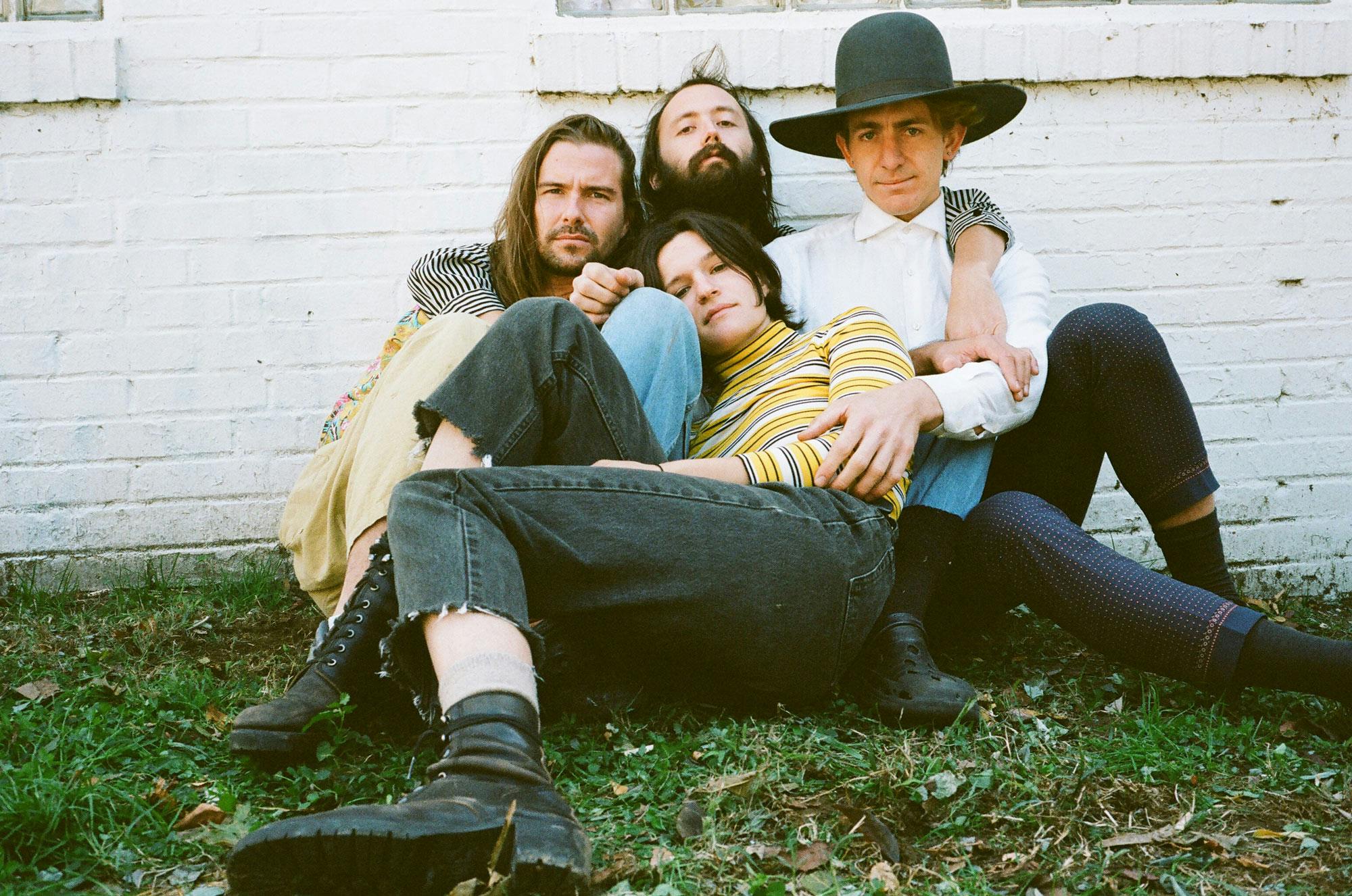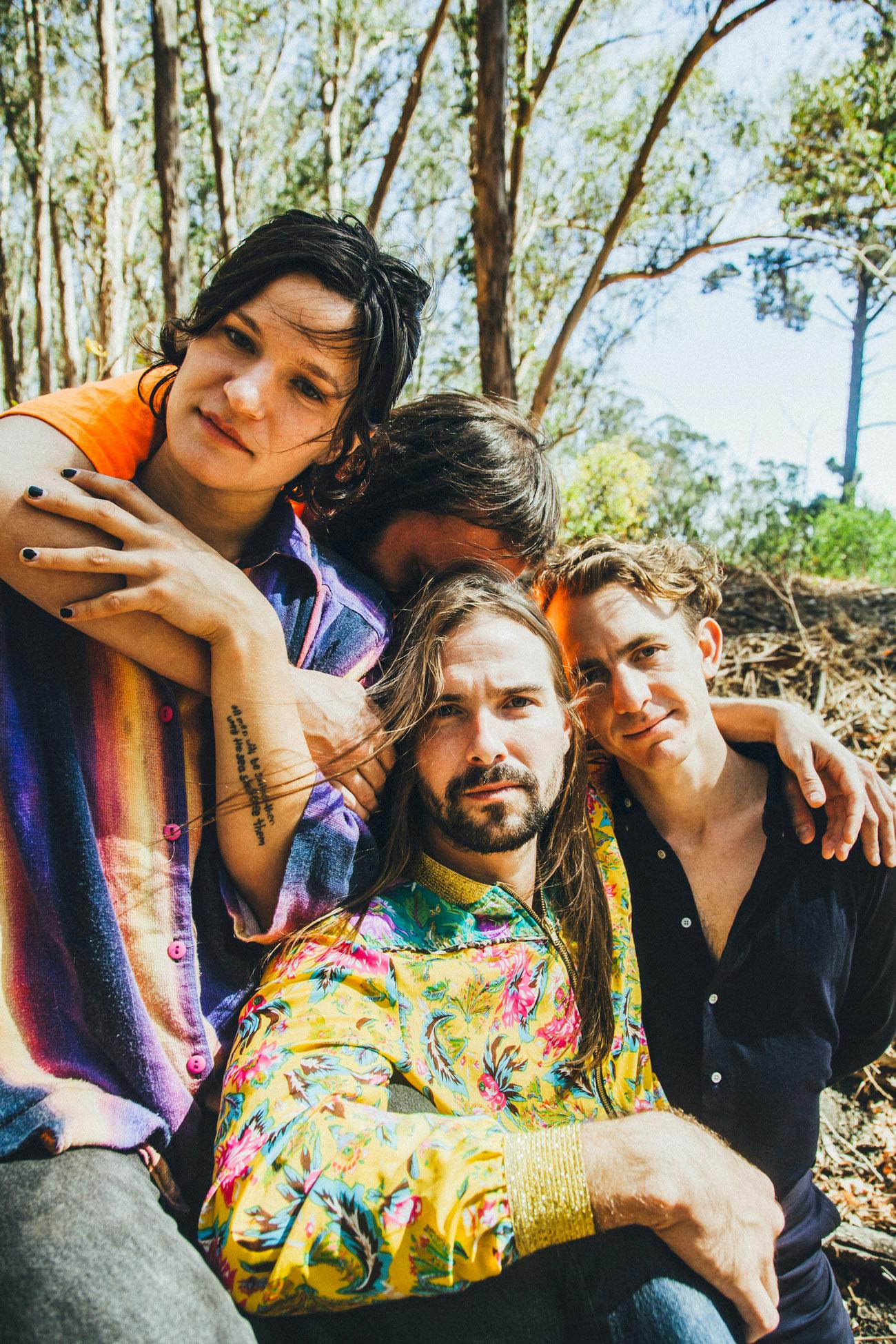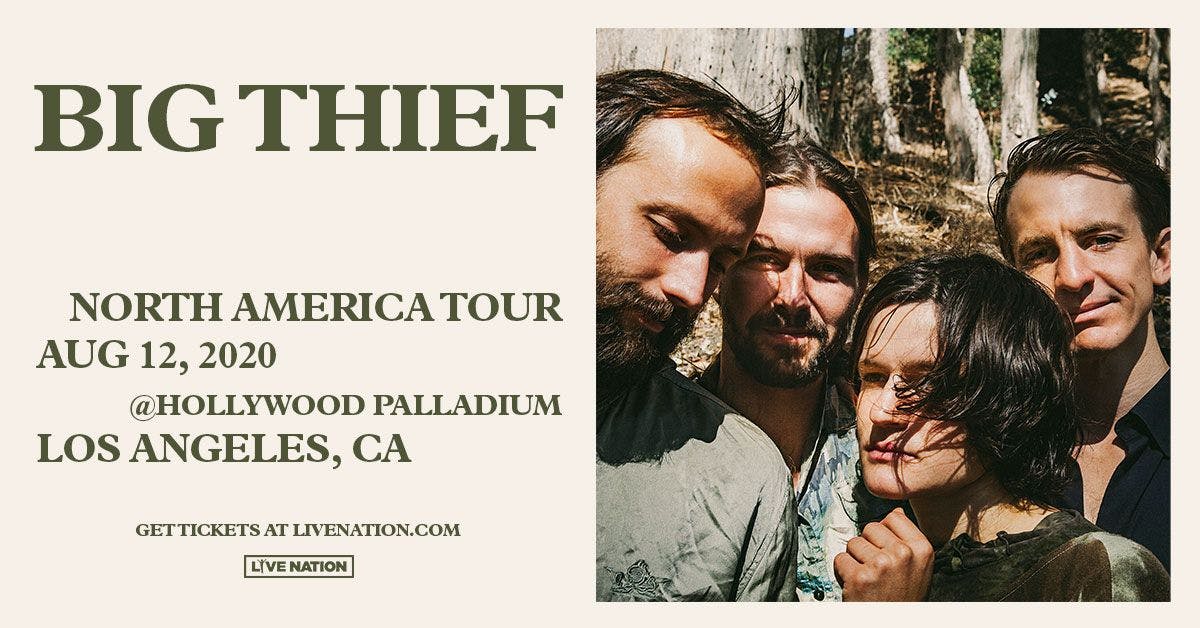SHARE
BIG THIEF

Eli Enis interviews the prolific Adrianne Lenker
|
Music
Adrianne Lenker is living entirely in the moment. She has to. The 28-year-old Big Thief frontwoman has been touring and making albums almost nonstop for over three years. Since 2016, Big Thief have released four records (two in 2019 alone) while maintaining a near-ceaseless tour schedule, and Lenker somehow managed to release a solo album in that time as well.
“And I think because we’ve had so much stimulus it’s forced me to be brutally present,” Lenker says. “Like, almost just completely in the moment.”
It’s early November and she’s calling from a Dallas hotel room that her bandmates and their team (ten people total) have been sharing for the last 24 hours. At a few points throughout our conversation, she apologetically pauses to tend to door knocks from people who are anxiously waiting to use the room to shower and relax. She suggests that that sort of bustling momentum is merely her day-to-day routine. Therefore, there simply isn’t time for her to reflect on the handful of years that’ve made her one of the most lauded voices in contemporary indie music.
“I think this whole lifestyle in general has gotten me a bit dizzy—but, like, in a good way,” she says. “I feel like it’s like a survival instinct or a preservation to not really dwell too much on anything that’s passed but to be completely present.”
Nevertheless, her recent past is worth mentioning. Big Thief’s 2016 debut Masterpiece (restless, scattered and, in hindsight, quite peppy) was their promising breakout. But the one that quickly followed, 2017’s Capacity, distinguished themselves in the crowded field of indie-folk. That record crystalized Lenker’s vivid, thoughtful songwriting style and the band’s rocking chair-like instrumentals; a signature sway that simultaneously gives into and propels Lenker’s alternately tender and tense vocal deliveries. It was well-received by the press and allotted them a loyal underground following, but their album from May of 2019, U.F.O.F., was treated like an instant classic. And then five months later they dropped another full-length, Two Hands, which they started recording just two days after U.F.O.F. was completed.
There aren’t many bands of Big Thief’s ilk who are releasing records at such a good clip, especially considering Lenker’s last three projects (including her 2018 solo album, abysskiss) were written entirely on the road. However, in spite of the band’s on-the-go writing process, U.F.O.F. and Two Hands each possess a remarkable sense of place. The former was recorded in the lush, secluded town of Woodinville, Washington, and the record sounds beautifully overgrown with vine-like instrumental layers and misty vocal effects. Two Hands was recorded in the exact opposite environment. the desert border town of Tornillo, Texas, and it, too, resembles the striking landscape it was born from. Without any vocal or instrumental overdubs and a number of songs that were recorded in one take, Two Hands is palpably dry, dusty, and earth-like.
“And I feel like there’s such distinctive feelings in both of those environments,” Lenker says. “Like, the temperate rainforest of Washington state. The oxygen, the ferns, the trees, the little cabins and insulated, tucked-away neighborhoods and the strangeness of it; eeriness kind of, sort of Twin Peaks-ish vibes. But also so much nature brimming. It’s so lush and I wrote songs while I was there because it just felt easy to create. I felt like I was affected.”
“And then when we were in the desert,” she continues, “Everything came more difficult. It was more challenging. Because if you look at the life around there, anything that survives has to be pretty robust. And I also felt it was like that. I didn’t do much writing, it was hard to get the sounds we were looking for, everything was less forgiving.”
Whereas a U.F.O.F. standout like “Cattails” gives off an easygoing appalachian folk vibe, Two Hands’ highlight is the toiling indie-rocker, “Not”, which spirals upwards like an infantile tornado before eventually unhinging into a whipping, two-minute guitar solo. There’s a sense of danger and menace throughout Two Hands, an intensity that’s emphasized by its sibling’s woodland serenity. A lot of that contrast was intentional, but not all of it.
There’s a sense of danger and menace throughout Two Hands, an intensity that’s emphasized by its sibling’s woodland serenity. A lot of that contrast was intentional, but not all of it.
We talked to Lenker about the similarities and differences between the two albums (both of which came from the same batch of songs), the tension Big Thief felt while recording at the southern border, and how Lenker considers all of her currently released material as a mere warm-up for what’s to come. Our conversation has been condensed for clarity:
You’ve used the phrase “earth twin” to describe Two Hands’ relationship with U.F.O.F., which indicates there’s a resemblance between the two. How do you see them as similar?
I feel that Two Hands feels like earth; it feels like mud and dirt and bones. You kind of can’t break it down much further, sonically. It’s just our instruments playing in a room together, being mic’d as simply as possible. And yeah, I feel like sonically U.F.O.F. is more ethereal and magical and kind of otherworldly. But then thematically I feel like it’s the inverse. And I only noticed that after the fact as well. It feels like Two Hands is sort of addressing global wounds and us as a floating orb with collective pain, and also like the constantly conflicting parts of our collective body—and also individual bodies and bodies in general—and the body as a finite form. And just looking at things from outside of them.
And then I feel like U.F.O.F. is going really internal and the abstractions of my own mind and painting together all of those things. Which, yeah, I didn’t really realize that ‘til later. But it’s interesting, kind of, what happened there. The more stripped down we got the bigger the songs became, and the more we built the structures of the songs and the arrangements the smaller the meanderings of the lyrics. If that makes sense? That’s just one way of looking at it.
You said you felt really inspired by the creative climate of Washington, so why did you want to go to the desert to record Two Hands?
Well we wanted the contrast and the challenge. And we weren’t going into it thinking, ‘Oh it’s gonna be harder to create in the desert.’ We were just going into it, like, let’s find two contrasting environments and make these records. I think it’s good, I think the songs on Two Hands needed a little fight, and we had to fight to bring the energy forth for that record. It was hot and dry and the speakers were less forgiving and less exciting in a way. To be excited by what we were playing, especially because we weren’t layering cool textures or sounds. We had to be able to play something and then listen back and go, “That’s it. It’s pretty much done.”
You talked about how it was a challenge to get that energy and working within that environment. But was there anything about it that was easier? Or maybe a relief?
I think the relief I found there was in the openness of the landscape, being able to see so far. But also there was just a lot of tension as well. There were a lot of unresolved knots of pain being right on the border. It’s not like I could just, like, dissolve the border with my mind, I wish I could’ve. There was a fence running right to the land that we recorded on. On the other side of it was Mexico and we would go on jogs every day up to the fence and it was so strange to be like, “Yeah, we little human beings decided to just put this funny little barrier here and create a lot of death as a result.” And just looking out on the landscape that so many people would maybe walk across to try and find a better life. It just felt intense to be right there on the border, and just that as an idea.
I felt tension but as a result I found a lot of intention coming to us. Because we were feeling intention and purpose being there, I think. Through this record, wanting to dissect our own reactions to the issues that are happening on the planet and us, I’m beginning to sort of know how to write about them as my own way. And I hope through the next decade that I can really come into myself as a writer and learn how to talk about things on an even deeper level. And also just bring hopefully care and some kind of vehicle for unification into the world.

I’ve read that Two Hands has the songs that you’re “most proud of” on it. Do you think that’s because of the purpose you felt being there and the way you performed them and all of that tension?
I don’t even know if I’m the most proud of them [laughs]. Like, it’s all fleeting and my relationships with songs are constantly changing. I mean I am really proud of them but I think some of them will last, I can imagine that my relationship with some of them will be long and I’ll be able to expand into their meanings or that their meanings will expand me continuously and reveal themselves over time.
I just feel like I’m so at the beginning, I just haven’t even been able to touch the kinds of things that I want to write yet. So it’s hard to say. I feel like all of that was just the preface, like a practice. Like all of these songs have just been practice and learning the craft of writing songs. A lot of my heroes were just beginning at my age, in their late twenties and became incredible writers throughout the following decades. And I feel like that’s kind of where I’m at. I’m just warming up and there’s so much learning that I wanna do.
You just seem so ready to keep going and you seem so excited about what the future might hold as a songwriter. Is there any part of you that’s worried about losing that ability to write so quickly and to learn from the craft?
Yeah, but I mean I’ve been worried about writer’s block since I was 16. And I’ve gone through periods of not writing, and I think yeah I get worried. But then, so what? I’m not going to hang on for dear life. If I really couldn’t write songs anymore it would probably be the universe actually pushing me into a different direction.
Which to me is exciting because that’s like, “Holy shit.” That’s an adventure. I’d rather, Big Thief as a band, gracefully bow out. I would rather us stop when it’s time to stop then push it into the ground and try to hold onto some old glory. I want for all of us to be ever renewing and giving birth to new versions of ourselves. That being said, because of that mentality and that attitude it’s very possible that we’ll find ourselves doing this in 30 years, when we’re 60. I feel like because of that attitude of not gripping and just letting go and letting it be, that’s why we’re more in love with each other than we’ve ever been as a band and as friends.
But as of now I feel like I’m in a serious time of a lot of input and I feel like I just emptied myself of 50 songs and now it’s clear again, and that’s a bit scary. But I think distance creates a longing which is really good to feel. I feel like I have distance from the craft of writing right now and a lot of hunger to say things that I don’t know how to say yet. And as much as I can feel panic from that, I think it’s good to remember that distance and hunger are [what] forge the next things.

SHARE
